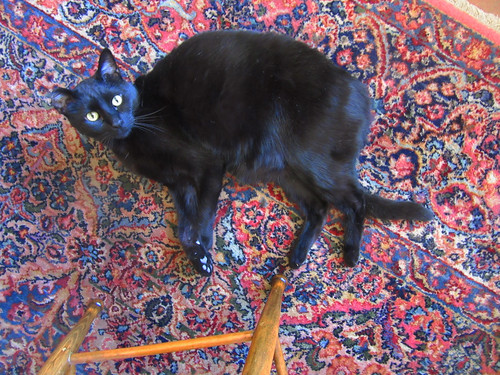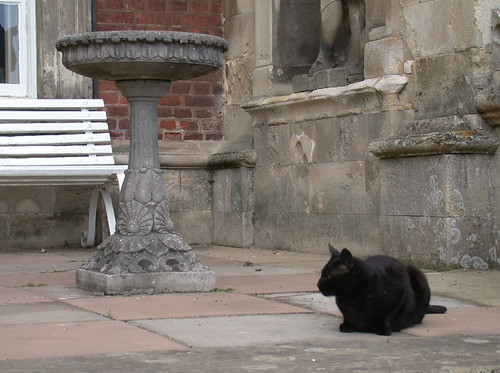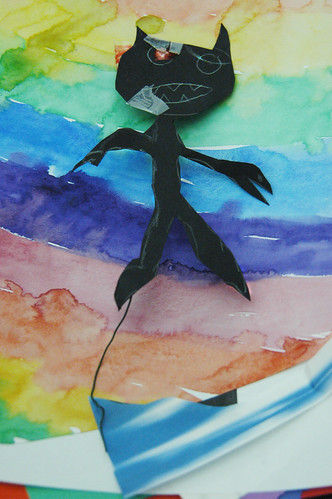[Re-airing a post from 2009; I think all links within it do remain "live".]
The first sentence of an
on-line biography gives a clue to this artist's likely Sun sign:
" ..... Francis Bacon was one of the most powerful and original figure painters in the twentieth century. He was particularly noted for the obsessive intensity of his work." And again the headline of a Guardian UK article describing the way Bacon is remembered by his friends: "The power and the passion" - two words often used in connection with......
Francis Bacon was born
28 October 1909, in Dublin, Ireland to English parents. He was a distant descendant of "the" Sir Francis Bacon, he of 16th century fame, he who said:
"In order for the light to shine so brightly, the darkness must be present." Sir Francis's recent relative relied very heavily on that darkness in his paintings.
A few examples of Bacon's paintings are shown at the end of this post. Offering insight, an extract from Anne Marie D. Lee's review of a Francis Bacon exhibition in New York:
"A Painter for Our Times, Francis Bacon Arrives at the Met."
Perhaps in more peaceful times, the impact of Bacon's blurred, pummeled faces and wide-mouth screams of man and beast could be received on a purely philosophical level, as acutely vivid allegories of existential angst. But in the context of today’s times, the juxtaposition of man and meat is all-too revolting, and the sight of nude biomorphic figures weirdly perched on pedestal or table all-too disturbing and real. It is art that speaks to, or more so howls at, the conditions of our own fear-ridden world, where violence and brutality have so savagely dehumanized the experience of life.
In one of a series of paintings called the Man in Blue, a businessman stares watchfully from the canvas--his face, a grotesque pallor of sickly phosphorescence, caged in vertical shadows and equipped with biting teeth. How easy it is to see in this sordid portrait study, and others like it, reflections of the unremorseful greed of bankers and CEOs, those for whom the heart is just another piece of meat.
In a previous room, Francis Bacon is quoted in a wall text as having once said, “I remember looking at dog shit on the pavement and I suddenly realized, there it is—this is what life is like.” Indeed the artist's work seethes with the anger of a damaged man, imprisoned within a world filled with physical pain and mental anguish. A world of shit, in other words. And remarkably like our own.

Bacon spent much of his life in England, with interludes in European cities including Berlin and Paris. A self-taught painter, inspired by Picasso, his works are, at best, disturbing. Sometimes in his work there's a similar feel to that found in the paintings of Frida Kahlo, though the style is quite different.
Described by those who knew him well as "conflicted yet charming".
Wikipedia's page on Bacon
"He could light up the day with his wit and generosity; he could equally well plunge it into gloom; and part of the excitement of being with him lay in not knowing for long which way it would go. It was fascinating to watch such sudden changes and contradictions within one person...Bacon could not be pinned down. The closer you got to him, the more likely he was to turn nasty or simply disappear -- to go through a wall into a life where you could not follow."
Bacon ultimately believed "that life was ridiculous," saying
"Even as a child, I knew [life] was impossible, a kind of charade." He was an outspoken atheist; homosexual, he moved in a social circle of louche bon vivants and heavy drinkers in London's Soho. Later in life, after the death of his longtime partner he withdrew from former friends to a quieter lifestyle.
He died in 1992.
A brief look at Francis Bacon's natal chart. Born 28 October 1909 in Dublin. His time of birth isn't known, so a 12 noon chart must suffice. Rising sign and degree of Moon, as shown, will not be accurate.


Oh my! There are two Grand Crosses here! One (as shown) is tighter than the other, and links Mercury, Neptune, Saturn and Uranus via square (90*) aspects, and throwing up two oppositions. The second, looser Grand Cross links Venus, Mars, Pluto and Jupiter. Such formations, made up of square and opposition aspects , reflect a life of constant challenge and/or inner conflict. Bacon had a double dose of this - no wonder his paintings are so dark and filled with angst! He seems to have been a seriously disturbed individual.
There are some more helpful trine(120*)aspects in this well-spread out natal chart. Venus, planet of the arts trines Saturn, planet of work and discipline, both in go-getting Fire signs. Mars, the drive planet trines Neptune, planet of imagination and creativity, both in emotional Water signs. So, in spite of his inner angst, he had sufficient positivity within him to use his conflict as inspiration to produce works of art which have, eventually, become world famous and command high prices.
Natal Moon, if Bacon's birth time was after 3pm would have been in Taurus, an earlier birth would put Moon in Aries. I won't hazard a guess which is more likely; I can see arguments for both.




Bacon deliberately subverted artistic conventions by using the triptych format of Renaissance altarpieces to show the evils of man, rather than the virtues of Christ. In Pope Innocent X he reworked a famous portrait by Velazquez into a screaming mask of angst."









There are interesting pieces about Francis Bacon at the
New Humanist , and
The Guardian UK














































